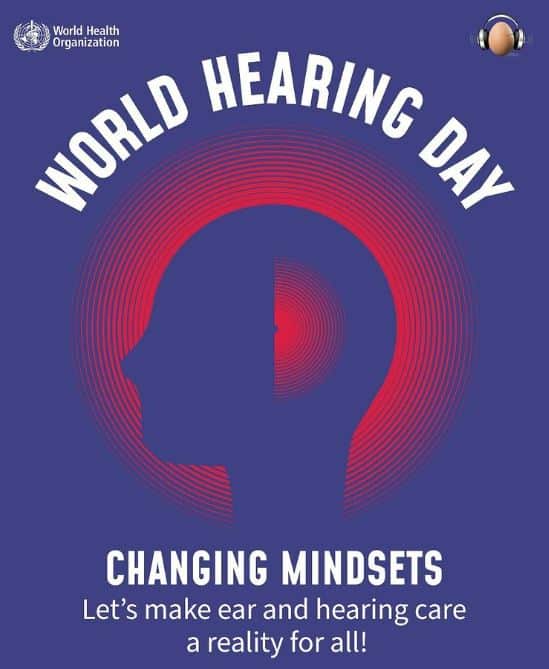World Hearing Day, held on March 3 annually, focuses the world on the importance of proper hearing care. Each year, The World Health Organization selects a theme to highlight. Last year’s was “Ear and hearing care for all” showcasing the importance of integrating ear and hearing care within primary care.
In 2022, the theme was “To hear for life, listen with care” focused on hearing loss prevention through safe listening.
This year’s theme of “Changing mindsets” might be the most important one yet. Until the importance of hearing care is understood by people with hearing loss, their care providers and society at large, ear and hearing care for all will remain out of reach.
What Does Changing Mindsets Mean?
 People change their minds all the time. I’ll have the burger. No, make that a salad.
People change their minds all the time. I’ll have the burger. No, make that a salad.
Changing mindsets is something different; and it’s not as simple as it sounds. Deeply held attitudes and beliefs can be sticky, especially negative ones that have been shrouded in stigma and shame for decades.
It took me years to come out of my hearing loss closet, in part because the stigma I felt went back generations. My father ingrained it in me just as his mother had taught it to him. It was not until I realized I was passing the same beliefs onto my children that I was able to break the cycle.
Several Types of Mindset Changes Needed
For the World Hearing Forum to reach its goals, several types of mindsets changes are needed.
1. People with hearing loss must release negative mindsets.
Feelings of stigma and shame are common among people with hearing loss. We do not want to appear “old” or “out of touch” or maybe we believe others will see us as “weak” or “incompetent.” Stigmas can be even stronger in other cultures around the world.
Stigma prevents people from seeking the hearing care that they require or even when they use hearing devices, from learning how to combine them with other strategies for communication success. Mindset changes (Gael Hannan and I call them MindShifts) are an important strategy discussed in our book Hear & Beyond: Live Skillfully with Hearing Loss. With an improved attitude, huge strides can be made toward better living with hearing loss.
2. The medical community must recognize hearing loss’ other health impacts.
Does your primary care doctor ask about your hearing? Mine rarely does, and she knows I wear hearing aids. This behavior is fairly common. It’s just a normal part of aging. Your hearing loss is not advanced enough—a hearing aid won’t help.
Attitudes like these within the medical community create significant barriers to care. If your doctor is not worried about your hearing loss, it is unlikely you will be motivated to do something about it.
3. Societal depictions of hearing loss must change.
While the Golden Bachelor did a lot to improve the portrayal of people with hearing loss on TV, other depictions have been less positive with characters foolishly hiding hearing aids in their sofa, or not wearing their devices regularly.
Even when hearing loss receives favorable news coverage, the stock images used often feature old and out-of-date technology, reinforcing the stigma that the articles claim is reversing.
Changing Mindsets Requires More than World Hearing Day
Changing mindsets about hearing loss will take prolonged effort by many. Organizations like World Hearing Forum help raise awareness on a global scale, but each of us in the hearing care arena has a role to play.
- When people with hearing loss wear devices with pride and request and use assistive listening or captioning devices in public spaces, we show the general public how proper hearing care help us live better lives.
- Providers can help shift the tide by educating their colleagues in the medical community and government agencies about the benefits of hearing care. And by providing person-centered care to clients that incorporates a full range of needed communication skills.
- Manufacturers can help by making unbranded images of modern hearing aids readily available for the press and other media organizations. Finding appropriate images of hearing devices shouldn’t be harder than finding the devices themselves.
If we all work together, step by step, mindsets will change. And one day, ear and hearing care will finally be available for all.

Shari Eberts is a passionate hearing health advocate and internationally recognized author and speaker on hearing loss issues. She is the founder of Living with Hearing Loss, a popular blog and online community for people with hearing loss, and an executive producer of We Hear You, an award-winning documentary about the hearing loss experience. Her book, Hear & Beyond: Live Skillfully with Hearing Loss, (co-authored with Gael Hannan) is the ultimate survival guide to living well with hearing loss. Shari has an adult-onset genetic hearing loss and hopes that by sharing her story, she will help others to live more peacefully with their own hearing issues. Connect with Shari: Blog, Facebook, LinkedIn, Twitter.







